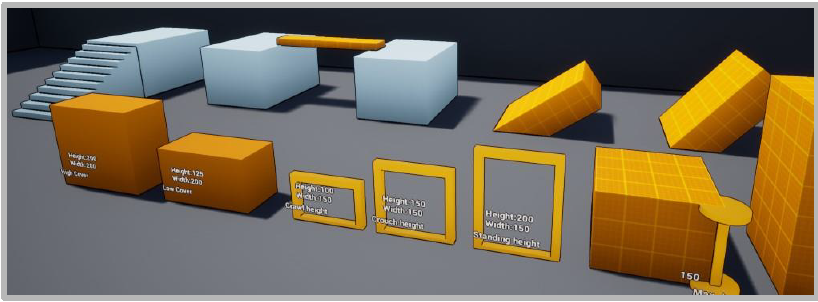Gym Scene
Also known as:
Classification
- #method
- #process/testing #process/developing
- #roles/designer #roles/engineers
- #used-by/engineers #used-by/designer
- #tools/digital
Intent
- Gain a practical overview of your level.
- Test your metrics, character controller, and mechanics.
- Evaluate how your level utilizes space effectively.
Problem
- You have a conceptualized level and want to test it.
- Mechanics, game plans, and the level layout are already defined.
Solution Approach
- Utilize a gym scene to test your planned and designed elements.
- Verify if everything functions as planned and aligns with your vision.
Application
Input
- A map (optional)
- Decisions about the game mechanics about to be implemented and tested
- Decisions on the interactable objects, not necessarily the finished assets
Application
- Build a level in your Game Engines of choice, doesn’t have to look like your planned level but should include all important elements of your gameplay
- Roughly define the blocks and objects as obstacles, interactables or other important elements. These can be Blockouts.
- Try to play the character and challenge the metrics and mechanics to find bugs as early as possible.
Output
- A platform with objects that you can use for testing what you had in mind, a form of Prototype.
- Different variations of your mechanics, e.g. different platforms for different jumping techniques, moving platforms.
When to use it
- For testing your mechanics and ideas
Relevant Roles using this model
- #roles/designer Designer #used-by/designer
- #roles/engineers Engineer #used-by/engineers
- Collaboration between these
Relevancy in the following processes
- Game Development Panning, Production and Testing Phase
- Gamespace Prototyping maybe in the blockout phase
Applicability
- It’s not an actual level, so avoid using it when you intend to create your level from a map. Instead, employ it to test the limits of your mechanics and discover new ideas that expand those mechanics.
Pros and Cons
Pros:
- Provides a quick way to create a practical testing environment without requiring polished assets.
- Identifies bugs and limitations early in development.
- Encourages the discovery of unforeseen possibilities.
Cons:
- Not a complete level, limiting its assessment to functional analysis.
- Challenging to evaluate storyline and gameplay beats; it’s primarily suited for exploration and mechanics testing.
Relation with other Methods
- The outputs from Massing are used to build the gym.
- Can test mechanics related to Symbols and Visual Language
- Tests out the Pillars, Goals and Features regarding their mechanics decisions.
Examples
-
 random blocks placed to test mechanic (Alex K. @TychoBolt, 2020)
random blocks placed to test mechanic (Alex K. @TychoBolt, 2020)
Relevant Tools
Relevant Literature
TychoBolt (K., Alex) 2020 - In Pursuit of Better Levels
...